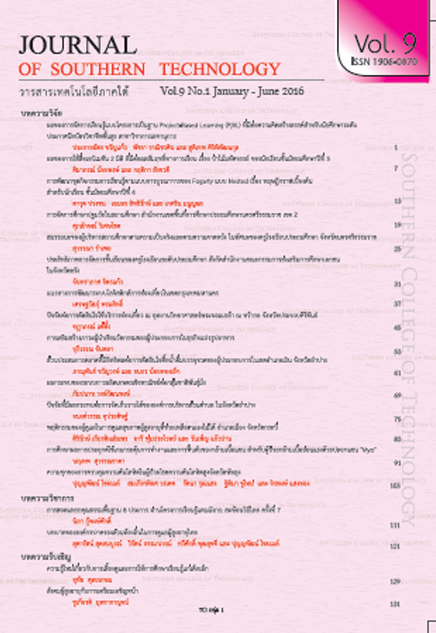การจัดการทรัพยากรมนุษย์ในธุรกิจอาหาร SMEs ย่านเยาวราช
Main Article Content
Abstract
ผลการวิจัยพบว่า (1) พนักงานในธุรกิจอาหาร SMEs ย่านเยาวราชมีการให้บริการในภาพรวมอยู่ในระดับมาก ทั้งด้านคุณลักษณะของพนักงานร้านอาหาร ( =4.13, S.D. =0.435) ด้านกระบวนการ (
=4.09, S.D. =0.417) และด้านคุณภาพการบริการ (
=4.04, S.D. =0.515) ตามลำดับ (2) การเปรียบเทียบความคิดเห็นของผู้ใช้บริการต่อการให้บริการของพนักงาน จำแนกตาม เพศ อายุ และอาชีพ พบว่า ในภาพรวมมีความคิดเห็นไม่แตกต่างกัน แต่เมื่อจำแนกตามรายได้ ค่าใช้จ่าย และความถี่ในการใช้บริการมีความคิดเห็นแตกต่างกันอย่างมีนัยสำคัญทางสถิติที่ระดับ .05 (3) ในการจัดการทรัพยากรมนุษย์ของผู้ประกอบการ พบว่า มีการสรรหาพนักงานทั้งจากภายนอกและภายในไม่ซับซ้อน จึงทำให้เกิดการหมุนเวียนเข้าออกของพนักงานในร้านอาหารบ่อยเนื่องจากพนักงานที่เข้ามาทำงานได้มาจากการชักชวนของเพื่อนญาติและจะออกไปทำงานที่ร้านอื่นที่ให้ค่าตอบแทนที่สูงกว่า ผู้ประกอบการจึงเผชิญกับปัญหาการขาดแคลนแรงงานและคุณภาพการบริการของพนักงานเมื่อต้องเปลี่ยนพนักงานใหม่ ในขณะที่ผู้ประกอบการมีการจัดการฝึกอบรมให้กับพนักงานด้วยวิธีการสอนงานการจ่ายค่าตอบแทนตามประกาศของรัฐบาล มีการจัดการดูแลความปลอดภัยให้กับพนักงาน และติดตามประเมินผลการปฏิบัติของพนักงานอย่างสม่ำเสมอ และ (4) แนวทางการพัฒนาการจัดการทรัพยากรมนุษย์ในธุรกิจอาหารในประเด็นสำคัญที่พบ ผู้ประกอบการควรนำกระบวนการ เทคนิคการธำรงรักษาพนักงานมาใช้เพื่อลดการหมุนเวียนของพนักงานในร้านและรักษาคุณภาพการบริการเป็นสิ่งที่สำคัญ
Human Resource Management in Food Business SMEs
The objectives of this research were to (1) study the customers’ opinions of small and medium-sized food enterprises (food SMEs) staff services (2) compare their opinions on the services according to different personal factors, and (3) study and offer an approach to development of human resource management in food businesses in Yaowarat areas. Four hundred customers and twenty-two entrepreneurs, staff and specialists were chosen as samples of the study. The research instruments were a questionnaire and interview questions. Percentages, mean, standard deviation, One way ANOVA and Least Square Difference (LSD) were analyzed.
Findings indicated that in overall, services of the food SMEs staff in Yaowarat, were of high level namely: concerning their personality ( =4.13, S.D. =0.435), operations of business (
=4.09, S.D.=0.417), and quality of the service (
=4.04, S.D.=0.515); in respective order. When taking their opinions into comparison, it was found that gender; age and occupation did not affect differences in their opinions regarding the food staff services. However, significant differences in opinions regarding services of customers of different income levels, expenses and frequencies of using the services were found at .05 levels. In terms of human resource management, there is no systematic plan of recruiting staff which led to high employees’ turnover. Most employees are introduced to the business via friends and relatives. Whenever other businesses offer them higher salaries elsewhere they would choose to leave the organization. Thus, the entrepreneurs will encounter problems of staff shortage and the quality of new employees. Interestingly, the entrepreneurs provide trainings for new employees, pay them at government rate, ensure their security, and always assess their work performance. As for the approaches to development of human resource management, the entrepreneurs should put retention process and techniques into practice in order to reduce high staff turnover and maintain service quality as their priority.
Article Details
-
Authors must agree to the journal publication rules and allow the editors to edit the manuscripts for publication.
-
Author’s right belongs to the author but Journal of Southern Technology holds the right of first publication and thus allow readers to use the article for the purpose of education but not commercial.

